The banner is to inform the visitors of an important message.
Solutions

In the realm of online transactions, PayPal has long been a dominant player. As a pioneer in the digital payments industry, it has provided businesses and individuals worldwide with a convenient and user-friendly platform for sending and receiving money. For many Australian businesses, PayPal has been the go-to solution for handling online transactions, offering a secure and globally recognised payment method.
However, as the digital landscape continues to evolve, so do the needs and preferences of businesses. A growing number of Australian businesses are seeking a PayPal alternative for a variety of reasons. Some are in search of lower transaction fees, others desire more tailored customer service, and still others require features that are not offered by PayPal. Additionally, the need for diversification in payment methods, both to increase customer convenience and to mitigate risks associated with relying on a single payment platform, is driving the exploration of other options.
Understanding the various payment options available for online transactions is crucial for businesses in today's digital age. It allows businesses to choose the platform that best aligns with their needs, potentially leading to cost savings, improved customer satisfaction, and enhanced operational efficiency.
In this article, we will delve into the world of PayPal alternatives, focusing specifically on options that are well-suited for Australian businesses. Whether you're a small business owner just starting your online journey or a seasoned e-commerce professional looking for better payment solutions, this guide aims to provide you with valuable insights to help you make an informed decision.
While PayPal has a strong presence in the online payment ecosystem, it's far from the only player. A number of other platforms offer similar services, and some of these may be better suited to the specific needs of Australian businesses. Let's take a look at some of these alternatives.
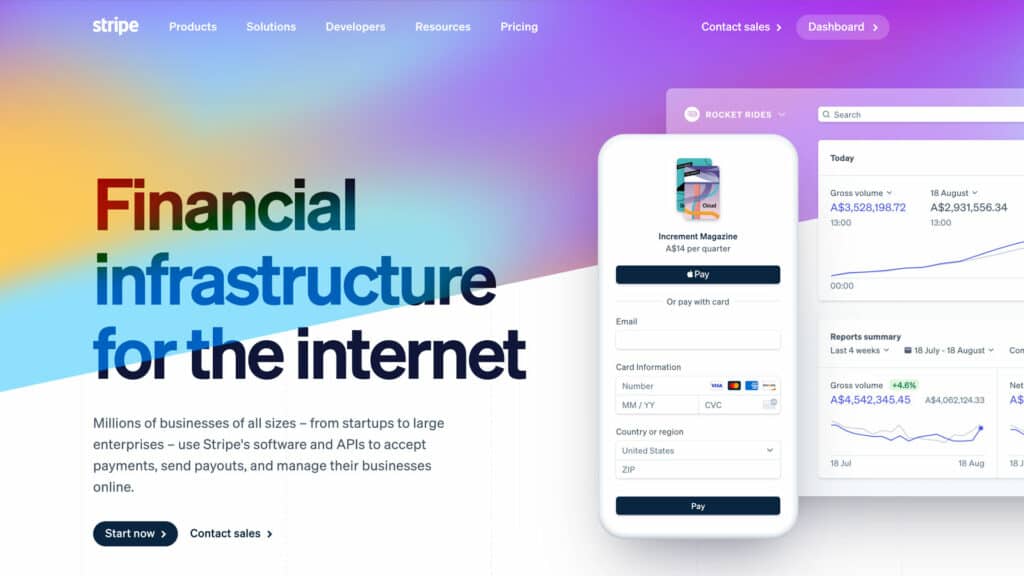
Stripe is a comprehensive payments platform designed for online businesses, offering a suite of payment APIs that allow businesses to accept and manage online transactions. Stripe is known for its flexibility, robust feature set, and developer-friendly tools and is a great PayPal alternative for freelancers.
Businesses can integrate Stripe into their websites or apps using the platform's APIs. Once integrated, Stripe provides a secure way to accept and process a variety of payment methods, including credit and debit cards, digital wallets, and local payment options.
Stripe charges a fee of 1.75% + 30¢ for domestic cards and 2.9% + 30¢ for international cards and digital wallets for Australian businesses. There are no setup fees, monthly fees, or hidden costs. However, fees can vary, so it's always a good idea to check the most current rates on the Stripe website.
Stripe's standout features include its highly customisable APIs, which allow businesses to create tailored payment experiences. Stripe also offers advanced reporting and analytics tools, built-in fraud protection, and support for subscription and recurring payments.
Stripe's wide range of features and customisable APIs make it a versatile choice for Australian businesses of all sizes. Its support for a variety of payment methods and currencies can be particularly beneficial for businesses that operate internationally.
While both Stripe and PayPal offer a wide range of features for online businesses, Stripe stands out for its customisability and developer-friendly tools. However, Stripe's per-transaction fees can be higher than PayPal's for certain types of transactions. Unlike PayPal, Stripe does not offer a ready-made payment button, so some technical setup is required.
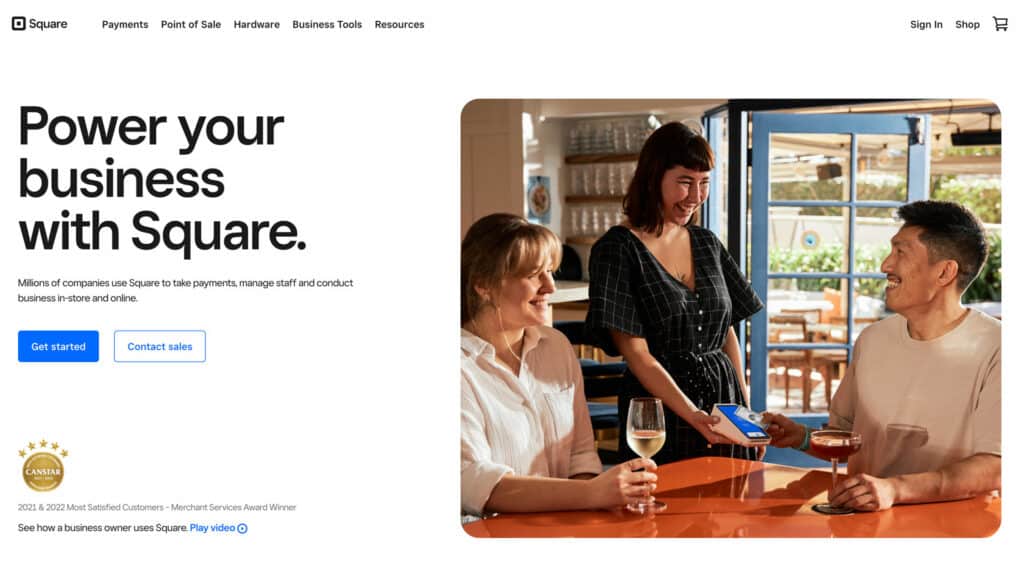
Square is a comprehensive payment solution that provides a range of services, including point-of-sale systems, online payments, and mobile payment processing. Square is known for its user-friendly interface, transparent pricing, and robust suite of business tools.
Businesses can use Square to accept payments in a variety of ways. Square provides hardware for accepting in-person payments, and businesses can also integrate Square into their websites or apps to accept online payments. Square's system is designed to be simple and easy to use, with no long-term contracts or hidden fees.
Square charges a fee of 1.9% for card-present transactions and 2.2% for online, card-not-present transactions for Australian businesses. There are no setup fees, monthly fees, or hidden costs. However, fees can vary, so it's always a good idea to check the most current rates on the Square website.
Square's standout features include its point-of-sale systems, which can be a significant advantage for businesses that operate both online and in-person. Square also offers a range of additional business tools, including inventory management, customer directories, and sales reports.
Square's wide range of features and transparent pricing make it a versatile choice for Australian businesses of all sizes. Its support for both online and in-person payments can be particularly beneficial for businesses that operate in multiple channels.
While both Square and PayPal offer a wide range of features for online businesses, Square stands out for its point-of-sale systems and additional business tools. However, Square's fees for online transactions can be higher than PayPal's, and it does not offer a digital wallet like PayPal does.
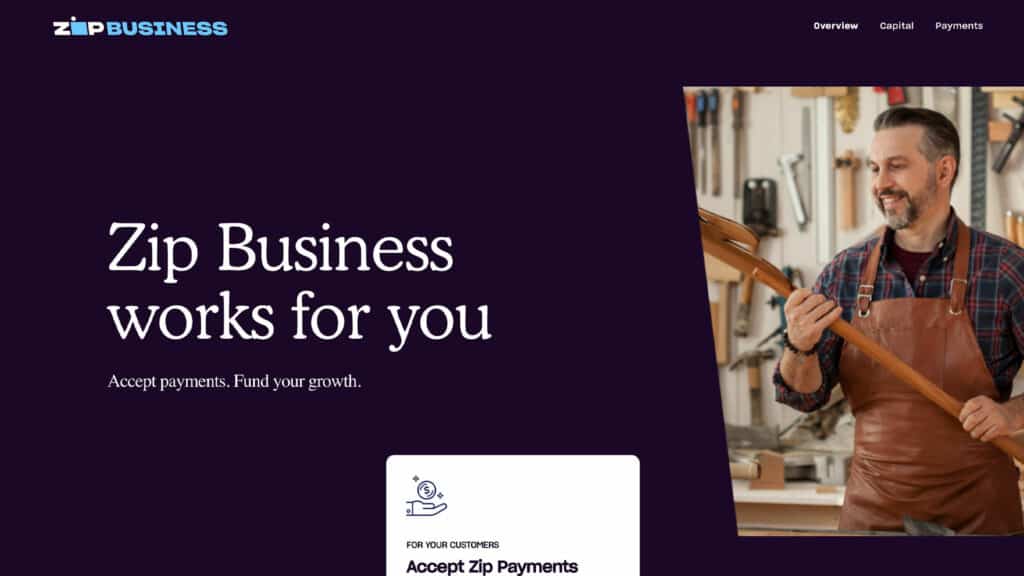
Zip, formerly known as ZipPay, is a buy now, pay later service that allows customers to make purchases now and pay for them over time. Zip is known for its flexible repayment options and interest-free terms.
Businesses can integrate Zip into their online checkout process. Once integrated, customers can choose Zip as their payment method at checkout. Zip pays the business upfront for the purchase, and the customer repays Zip according to their chosen repayment schedule.
Zip charges businesses a merchant fee for each transaction. The exact fee can vary based on the business's volume of sales. There are no setup fees or monthly fees. However, fees can vary, so it's always a good idea to check the most current rates on the Zip website.
Zip's standout feature is its buy now, pay later service, which offers customers flexibility in how they repay their purchases. This can be a significant advantage for businesses that sell higher-priced items.
Zip's popularity among consumers and its ability to boost conversion rates and average order values can make it a good choice for Australian businesses. However, its merchant fees can be higher than some other payment options.
While both Zip and PayPal offer a wide range of features for online businesses, Zip stands out for its buy now, pay later service. However, Zip's merchant fees can be higher than PayPal's, and it does not offer a digital wallet or the ability to accept payments from PayPal accounts.
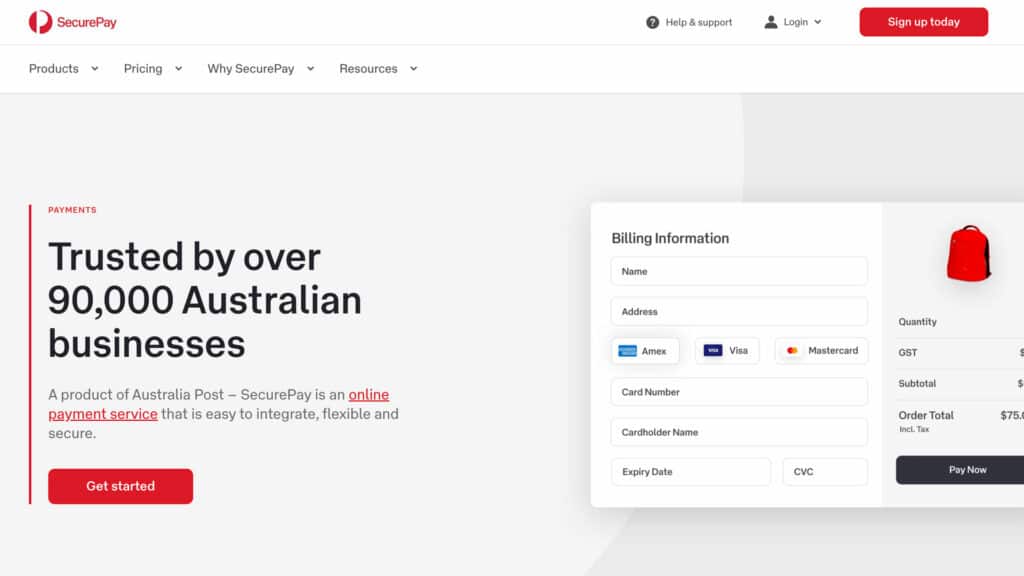
SecurePay, a business of Australia Post, is a premium online payment gateway for Australian businesses. It offers a range of solutions designed to make accepting payments online quick, easy, and secure. SecurePay is known for its robust security features and integration with a wide range of e-commerce platforms and is a great PayPal alternative for business.
Businesses can integrate SecurePay into their websites or apps using the platform's APIs. Once integrated, SecurePay provides a secure way to accept and process a variety of payment methods, including credit and debit cards. SecurePay also offers a virtual terminal for processing phone orders.
SecurePay charges a flat fee of 2.4% per transaction for Australian businesses. There are no setup fees or monthly fees. However, fees can vary, so it's always a good idea to check the most current rates on the SecurePay website.
SecurePay's standout features include its robust security measures, which include fraud prevention tools and full compliance with the Payment Card Industry Data Security Standard (PCI DSS). SecurePay also offers detailed reporting and analytics tools.
SecurePay's strong security features, competitive pricing, and wide range of features make it a strong choice for Australian businesses of all sizes. Its support for a variety of payment methods and integration with many popular e-commerce platforms add to its appeal.
While both SecurePay and PayPal offer a wide range of features for online businesses, SecurePay stands out for its robust security measures and competitive pricing. However, unlike PayPal, SecurePay does not offer a digital wallet or the ability to accept payments from PayPal accounts.
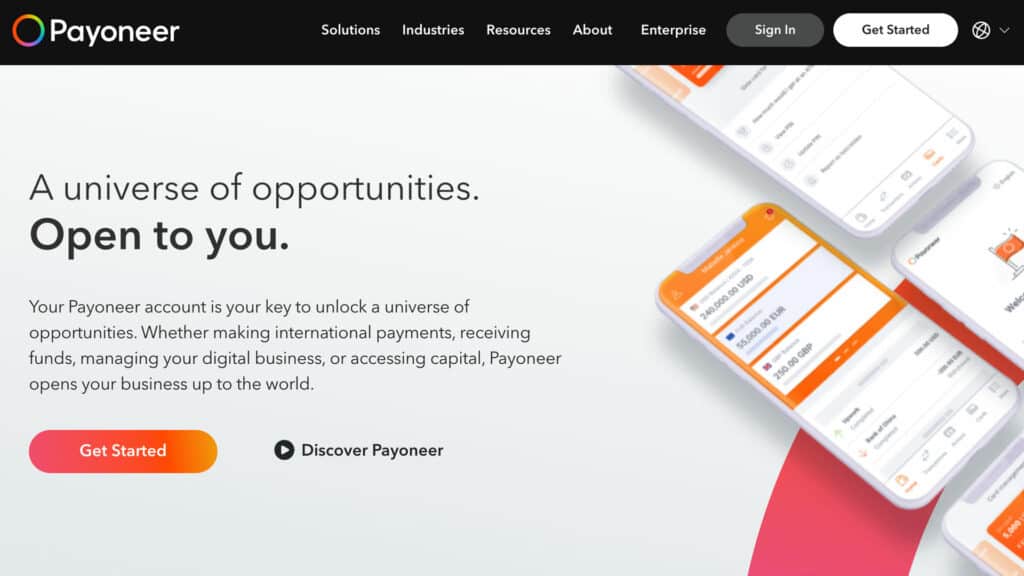
Payoneer is a financial services company that provides online money transfer, digital payment services, and provides customers with working capital. It's known for its cross-border payments platform and currency conversion services.
Businesses can use Payoneer to receive payments from customers, marketplaces, and clients worldwide. Once a payment is received, it can be withdrawn to a bank account or used to make payments to other Payoneer users. Payoneer also offers a Mastercard that can be used to make purchases or withdraw cash from ATMs.
Payoneer charges a 1% fee to receive payments from other Payoneer customers. Fees for receiving payments from marketplaces and clients can vary, and there may also be fees for currency conversion and ATM withdrawals. It's always a good idea to check the most current rates on the Payoneer website.
Payoneer's standout features include its strong support for international transactions, including support for multiple currencies and local bank transfers in over 150 countries. Payoneer also offers value-added services like tax form assistance and working capital funding.
Payoneer's strong support for international transactions can make it a good choice for Australian businesses that operate internationally. However, its fees for certain types of transactions can be higher than some other options.
While both Payoneer and PayPal offer a wide range of features for online businesses, Payoneer stands out for its strong support for international transactions and value-added services. However, Payoneer's fees for certain types of transactions can be higher than PayPal's, and it may not be as widely recognised or accepted as PayPal.
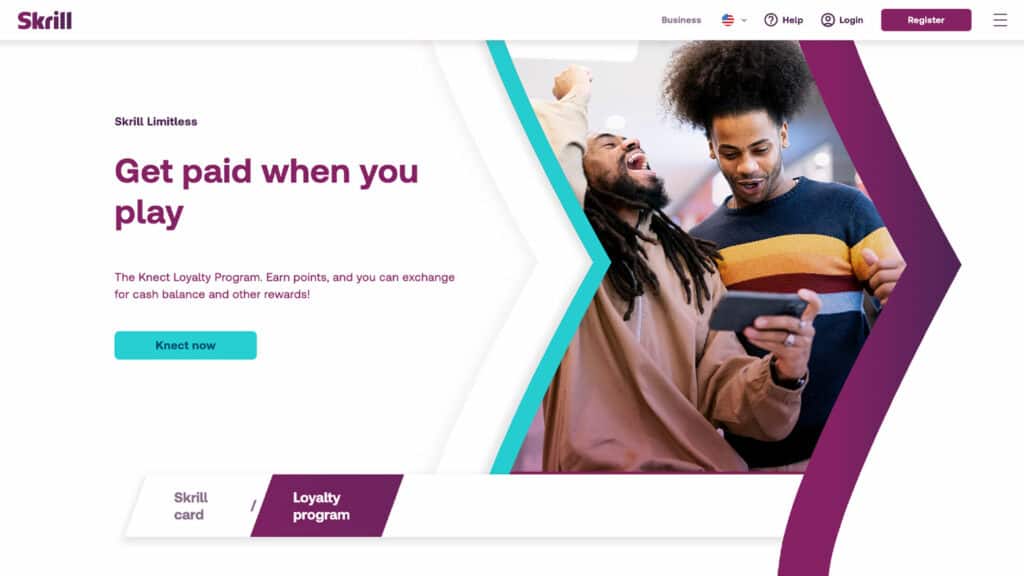
Skrill is a digital wallet provider and online payment service that allows businesses and individuals to make payments and money transfers over the internet. Skrill is known for its simplicity, security, and international money transfer capabilities.
Businesses can integrate Skrill into their websites or apps to accept payments from customers. Once integrated, Skrill provides a secure way to accept and process a variety of payment methods, including credit and debit cards, bank transfers, and payments from Skrill digital wallets.
Skrill charges a fee of 1.9% + $0.29 per transaction for Australian businesses. There may also be fees for currency conversion and international transfers. However, fees can vary, so it's always a good idea to check the most current rates on the Skrill website.
Skrill's standout features include its digital wallet, which allows customers to make payments and transfers without sharing their financial details. Skrill also offers a prepaid Mastercard, which can be used to access funds in the Skrill account.
Skrill's digital wallet and international transfer capabilities can make it a good choice for Australian businesses that operate internationally. However, its fees for certain types of transactions can be higher than some other options.
While both Skrill and PayPal offer a wide range of features for online businesses, Skrill stands out for its digital wallet and prepaid Mastercard. However, Skrill's fees for certain types of transactions can be higher than PayPal's, and it may not be as widely recognised or accepted as PayPal.
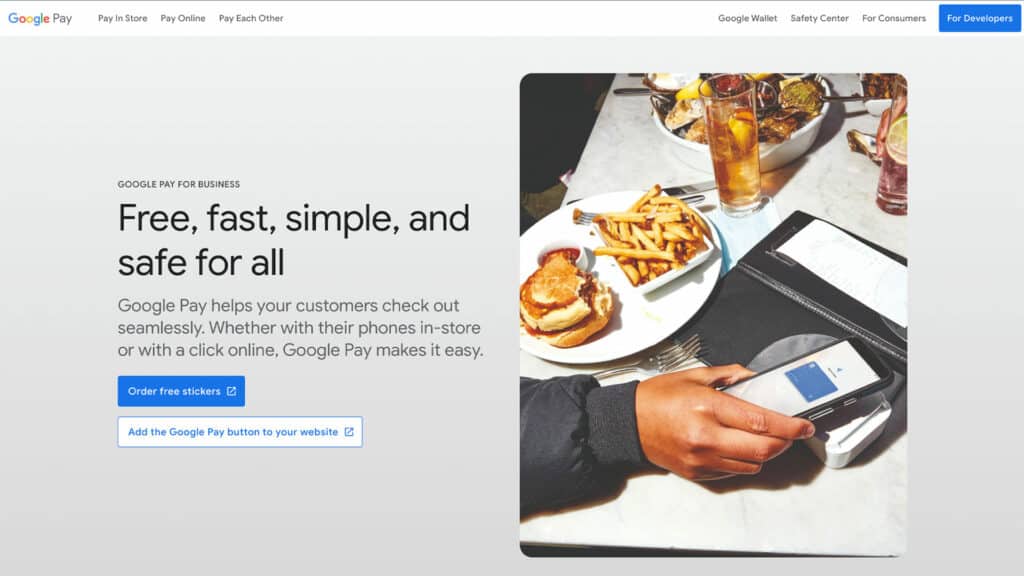
Google Pay is a digital wallet platform and online payment system developed by Google. It allows users to make payments with smartphones, tablets, or watches. Google Pay is known for its simplicity, security, and integration with other Google services.
Businesses can integrate Google Pay into their websites or apps to accept payments from customers. Once integrated, customers can choose to pay with Google Pay at checkout. The payment is then transferred from the customer's Google Pay account to the business's account.
Google Pay does not charge fees for using the service. However, if businesses are using a payment gateway or merchant account to process payments, those services may charge their own fees.
Google Pay's standout features include its integration with other Google services and its strong security measures, which include tokenisation of card information. Google Pay also supports in-store payments via NFC and online payments in apps and on websites.
Google Pay's wide range of features and strong security measures make it a good choice for Australian businesses of all sizes. Its support for both online and in-store payments can be particularly beneficial for businesses that operate in multiple channels.
While both Google Pay and PayPal offer a wide range of features for online businesses, Google Pay stands out for its integration with other Google services and its support for in-store payments. However, unlike PayPal, Google Pay does not offer a digital wallet where users can store money.
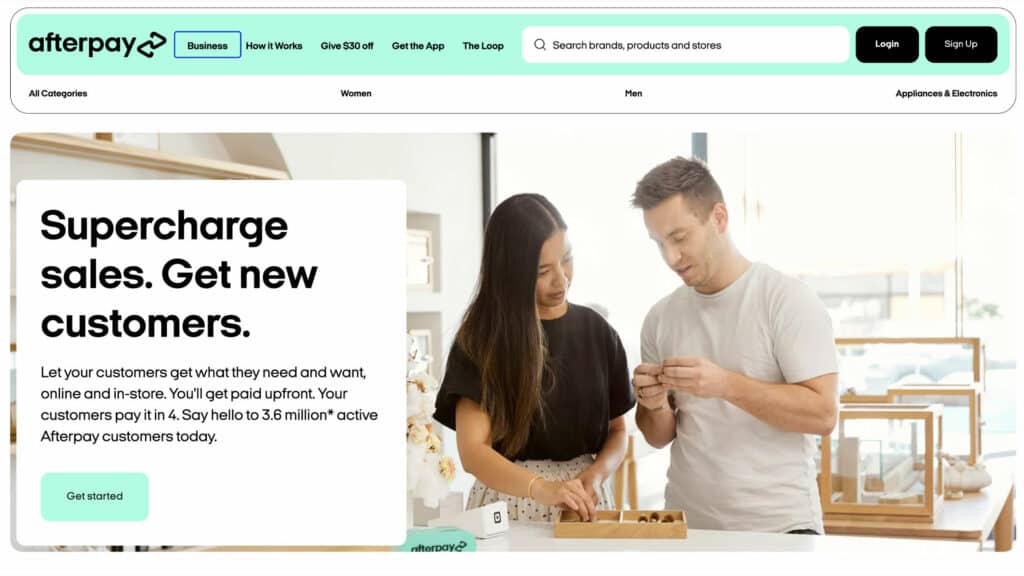
AfterPay is a buy now, pay later service that allows customers to purchase products immediately and pay for them in four equal installments, due every two weeks. AfterPay is known for its interest-free installment plans and wide acceptance among retailers.
Businesses can integrate AfterPay into their online checkout process. Once integrated, customers can choose AfterPay as their payment method at checkout. AfterPay pays the business upfront for the purchase, and the customer repays AfterPay in installments.
AfterPay charges businesses a fixed transaction fee and a commission that varies based on the business's volume of sales. There are no setup fees or monthly fees. However, fees can vary, so it's always a good idea to check the most current rates on the AfterPay website.
AfterPay's standout feature is its buy now, pay later service, which allows customers to spread the cost of their purchases over several payments. This can be a significant advantage for businesses that sell higher-priced items.
AfterPay's popularity among consumers and its ability to boost conversion rates and average order values can make it a good choice for Australian businesses. However, its fees can be higher than some other payment options.
While both AfterPay and PayPal offer a wide range of features for online businesses, AfterPay stands out for its buy now, pay later service. However, AfterPay's fees for businesses can be higher than PayPal's, and it does not offer a digital wallet or the ability to accept payments from PayPal accounts.
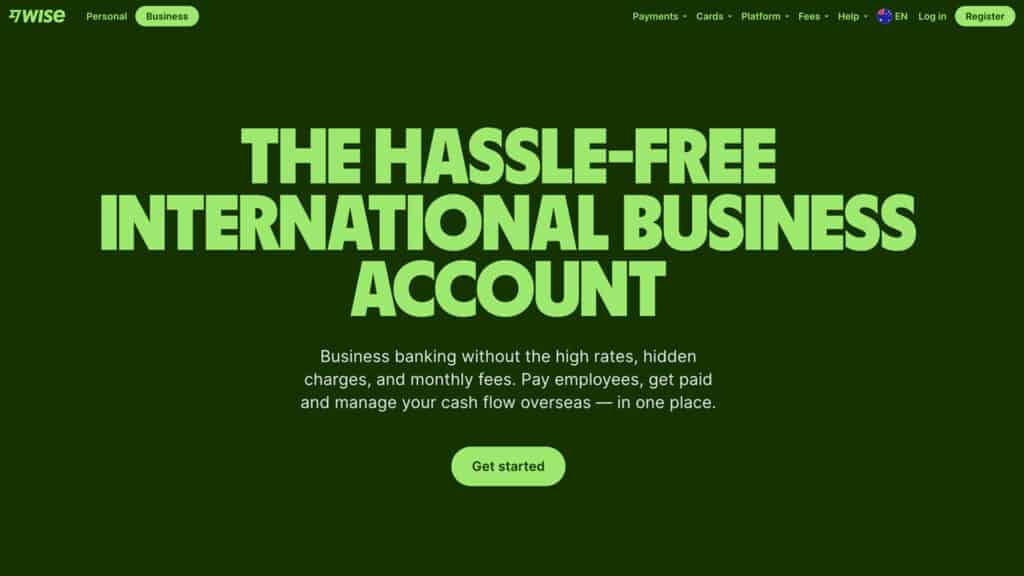
Wise is a financial technology company that provides international money transfer services. It's known for its transparency, low fees, and the use of the real exchange rate (the mid-market rate) for currency conversion.
Businesses can use Wise to send and receive money internationally, hold money in multiple currencies, and get local bank details for multiple countries. This can be particularly useful for businesses that have customers, suppliers, or employees in different countries.
Wise charges a small, upfront fee for international transfers. The fee is typically a percentage of the transfer amount, and it varies based on the currencies involved and the payment method. There are no setup fees or monthly fees. However, fees can vary, so it's always a good idea to check the most current rates on the Wise website.
Wise's standout features include its use of the real exchange rate for currency conversion, which can result in significant savings compared to traditional banks and other payment services. Wise also offers a multi-currency account that allows businesses to hold and manage money in multiple currencies.
Wise's low fees and multi-currency features can make it a good choice for Australian businesses that operate internationally. However, Wise is not a full-service bank, and it does not offer some services that businesses may need, such as business loans or merchant services.
While both Wise and PayPal offer a wide range of features for online businesses, Wise stands out for its low fees and multi-currency features. However, unlike PayPal, Wise does not offer a digital wallet or the ability to accept payments from customers directly.
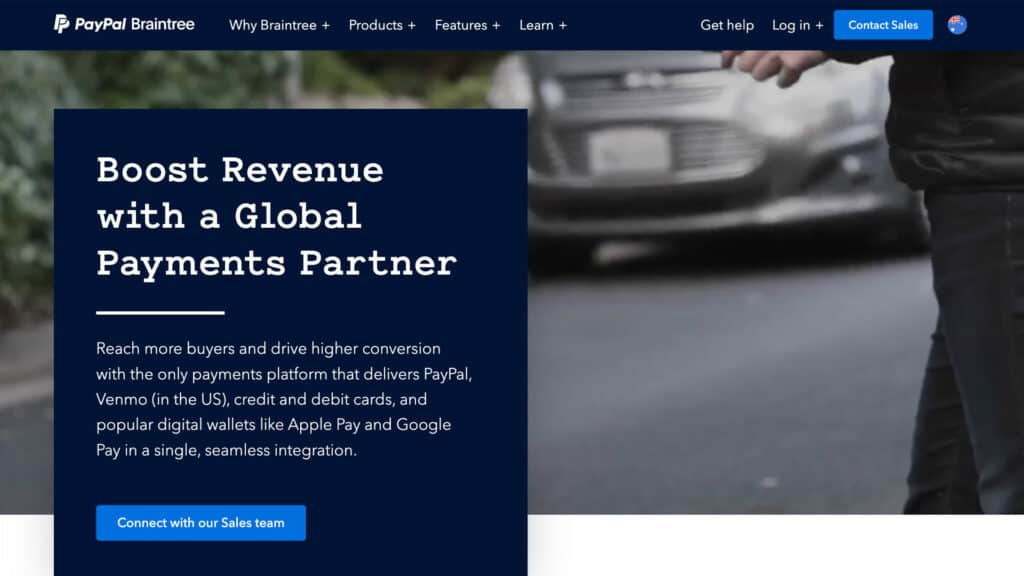
Braintree is a full-stack payments platform that is part of the PayPal family. It provides businesses with the ability to accept payments in multiple currencies and through various payment methods, including credit and debit cards, digital wallets, and PayPal itself. Braintree is known for its robust, customisable payment experiences and excellent security features.
Businesses can integrate Braintree into their websites or apps using the platform's APIs. Once integrated, Braintree provides a secure way to collect and process payment information. The platform handles tasks like payment encryption and fraud prevention, allowing businesses to focus on their core operations.
Braintree charges a standard fee of 1.75% + $0.30 AUD for domestic Australian cards, and a 2.9% + $0.30 AUD fee for American Express, international cards, and digital wallets. There are no monthly fees, minimums, or setup fees. However, fees can vary, so it's always a good idea to check the most current rates on the Braintree website.
One of Braintree's standout features is its advanced fraud protection tools, which use machine learning to help businesses detect and prevent fraudulent transactions. Braintree also offers detailed reporting and analytics tools, and its APIs are highly customisable, allowing businesses to create a payment experience that fits their specific needs.
Braintree's ability to accept a wide range of payment methods and currencies makes it a good fit for Australian businesses that operate internationally. Its advanced fraud protection tools can also be a significant advantage for businesses that are concerned about online fraud.
While Braintree is part of the PayPal family, it offers a different set of features. Unlike PayPal, which provides a ready-made payment solution, Braintree offers a more customisable platform that businesses can integrate directly into their own websites or apps. However, Braintree's fees for certain transactions can be higher than PayPal's standard fees.
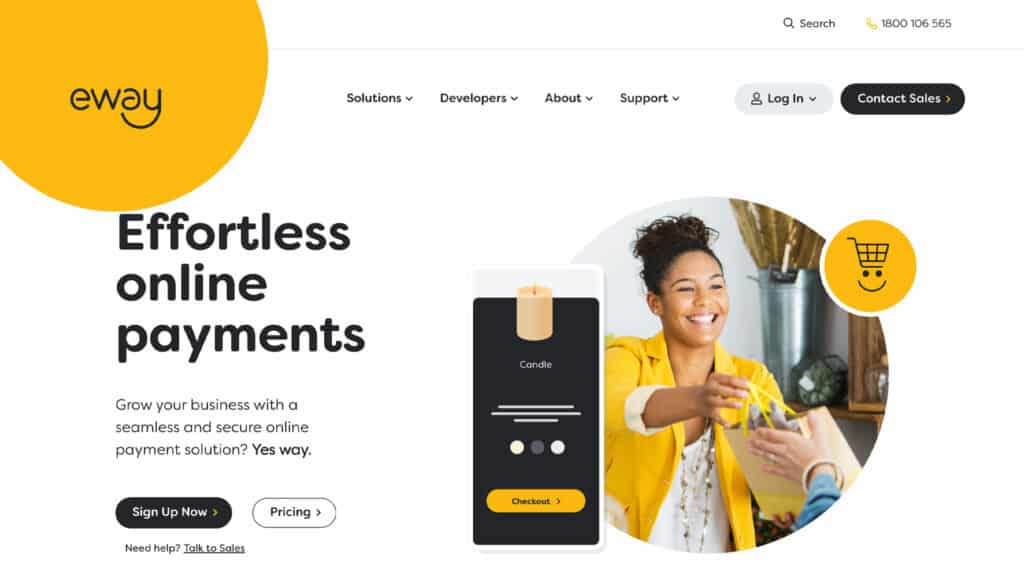
Eway is a leading payment gateway provider in Australia. It offers a secure and reliable platform for businesses to accept online payments. Eway is known for its straightforward setup, local customer support, and integration with a wide range of e-commerce platforms.
Businesses can integrate Eway into their websites or apps using the platform's APIs. Once integrated, Eway provides a secure way to accept and process a variety of payment methods, including credit and debit cards. Eway also offers a virtual terminal for processing phone orders.
Eway charges a flat fee of 1.5% + 25¢ per transaction for Australian businesses. There are no setup fees or monthly fees. However, fees can vary, so it's always a good idea to check the most current rates on the Eway website.
Eway's standout features include its local customer support, which can be a significant advantage for businesses that value accessible and responsive service. Eway also offers a range of fraud prevention tools and supports recurring payments and pre-authorisations.
Eway's local presence, competitive pricing, and wide range of features make it a strong choice for Australian businesses of all sizes. Its support for a variety of payment methods and integration with many popular e-commerce platforms add to its appeal.
While both Eway and PayPal offer a wide range of features for online businesses, Eway stands out for its local customer support and competitive pricing. However, unlike PayPal, Eway does not offer a digital wallet or the ability to accept payments from PayPal accounts.

Before we delve into the alternatives, let's first take a closer look at PayPal itself. Understanding how PayPal works and its specific advantages and disadvantages for Australian businesses will provide a solid foundation for evaluating other options.
PayPal operates as an online payment system that supports online money transfers. It serves as an electronic alternative to traditional paper methods like checks and money orders. For businesses, PayPal offers a secure platform for accepting payments from customers, both domestically and internationally.
Australian businesses can use PayPal to accept payments in multiple currencies, making it easier to sell products or services to customers around the world. Payments can be accepted through a website, over the phone, or in person using a mobile card reader. Once a payment is received, the funds can be transferred to a linked bank account or used to make purchases or pay invoices directly from the PayPal account.
PayPal offers several advantages for businesses. Its global recognition and trust can help increase conversion rates, as customers are often more comfortable paying through a platform they know and trust. PayPal also offers seller protection on eligible sales, and its ability to handle international payments can help businesses reach a global customer base.
For Australian businesses, PayPal's integration with popular e-commerce platforms like Shopify and WooCommerce can simplify the process of setting up online payments. PayPal's reporting and analytics tools can also provide valuable insights into sales trends and customer behavior.
Despite its advantages, PayPal may not be the perfect fit for every business. One of the main drawbacks of PayPal is its fees. PayPal charges a percentage of the transaction amount plus a fixed fee for each sale. While these fees are competitive, they can add up, particularly for businesses with high sales volumes.
Another potential issue is that PayPal can freeze accounts if it detects suspicious activity. While this is part of PayPal's efforts to prevent fraud, it can cause issues for businesses if there are misunderstandings or errors.
Finally, some businesses and customers have reported customer service issues with PayPal. While many users have positive experiences, others have reported difficulties resolving issues or getting timely responses to queries.

Choosing the right PayPal alternative for your Australian business is a critical decision that can significantly impact your operations, customer satisfaction, and bottom line. Here are some factors to consider and tips for making the switch.
Remember, the right payment platform for your business is the one that best meets your unique needs. By considering all your options and carefully planning your switch, you can find a PayPal alternative that offers the features, pricing, and performance that your Australian business needs.
Navigating the world of online payments can be a complex task, but it's an essential one in today's digital age. For Australian businesses, PayPal has long been a trusted and reliable option, offering a range of features that facilitate easy online transactions. However, as we've explored in this article, there are numerous PayPal alternatives that may better suit your specific needs.
From the simplicity and security of Google Pay to the buy now, pay later model of AfterPay and Zip, the flexibility of Wise's multi-currency features, and the robust point-of-sale systems offered by Square, there's a wealth of options available. Each comes with its own unique set of features, fees, and benefits, making it crucial to consider your business's specific requirements when choosing a payment platform.
Remember, factors such as fees, ease of use, customer service, and integration with other systems should all play a part in your decision-making process. And when you're ready to make the switch, careful planning, clear communication with customers, and thorough testing can help ensure a smooth transition.
In conclusion, the importance of choosing the right payment system for your business cannot be overstated. The right platform can streamline your operations, improve customer satisfaction, and even boost your bottom line. So take the time to explore your options, weigh the pros and cons, and make the choice that's right for your Australian business. In the ever-evolving landscape of digital commerce, staying adaptable and choosing the most fitting tools for your business are key to staying ahead.